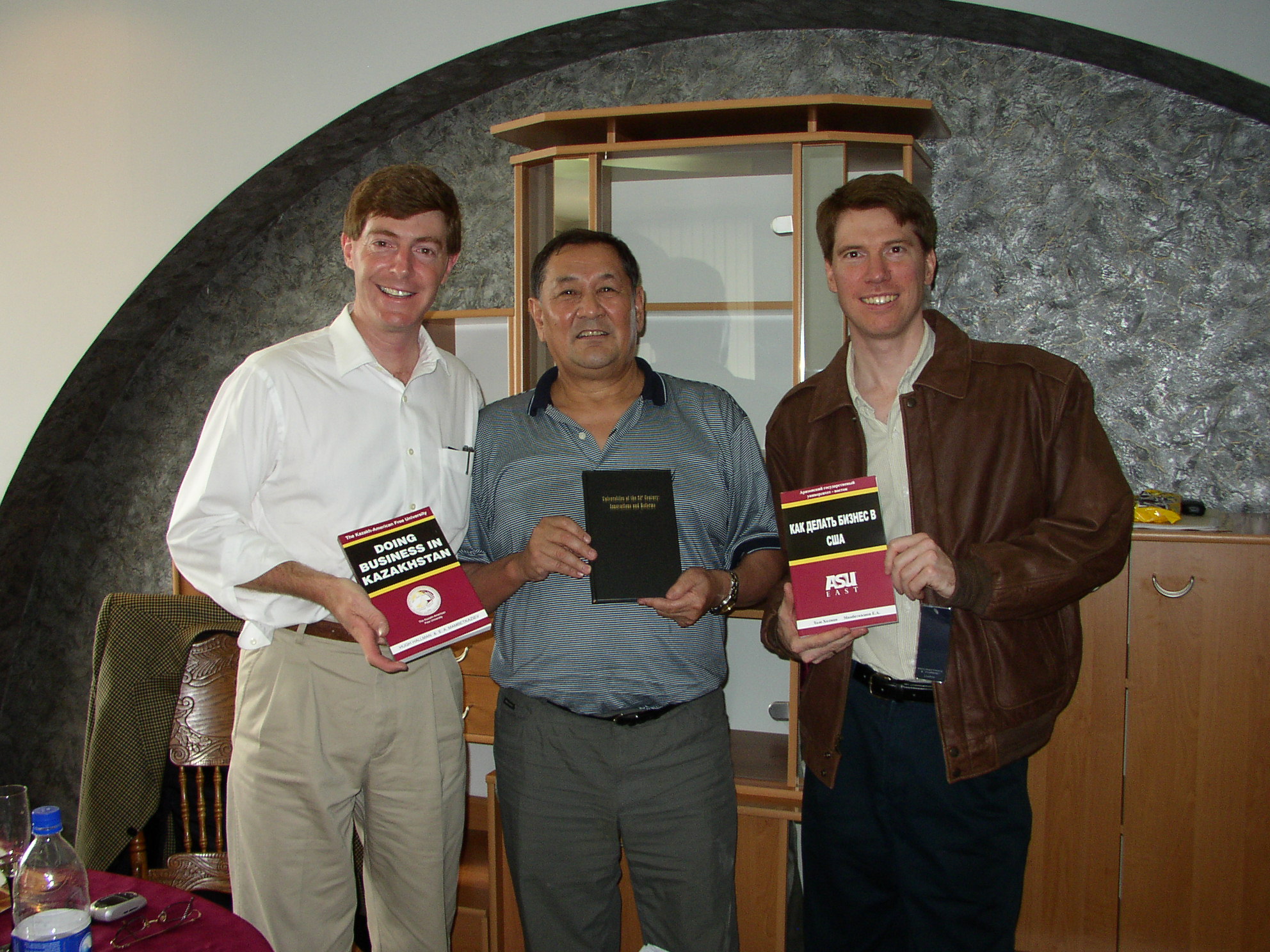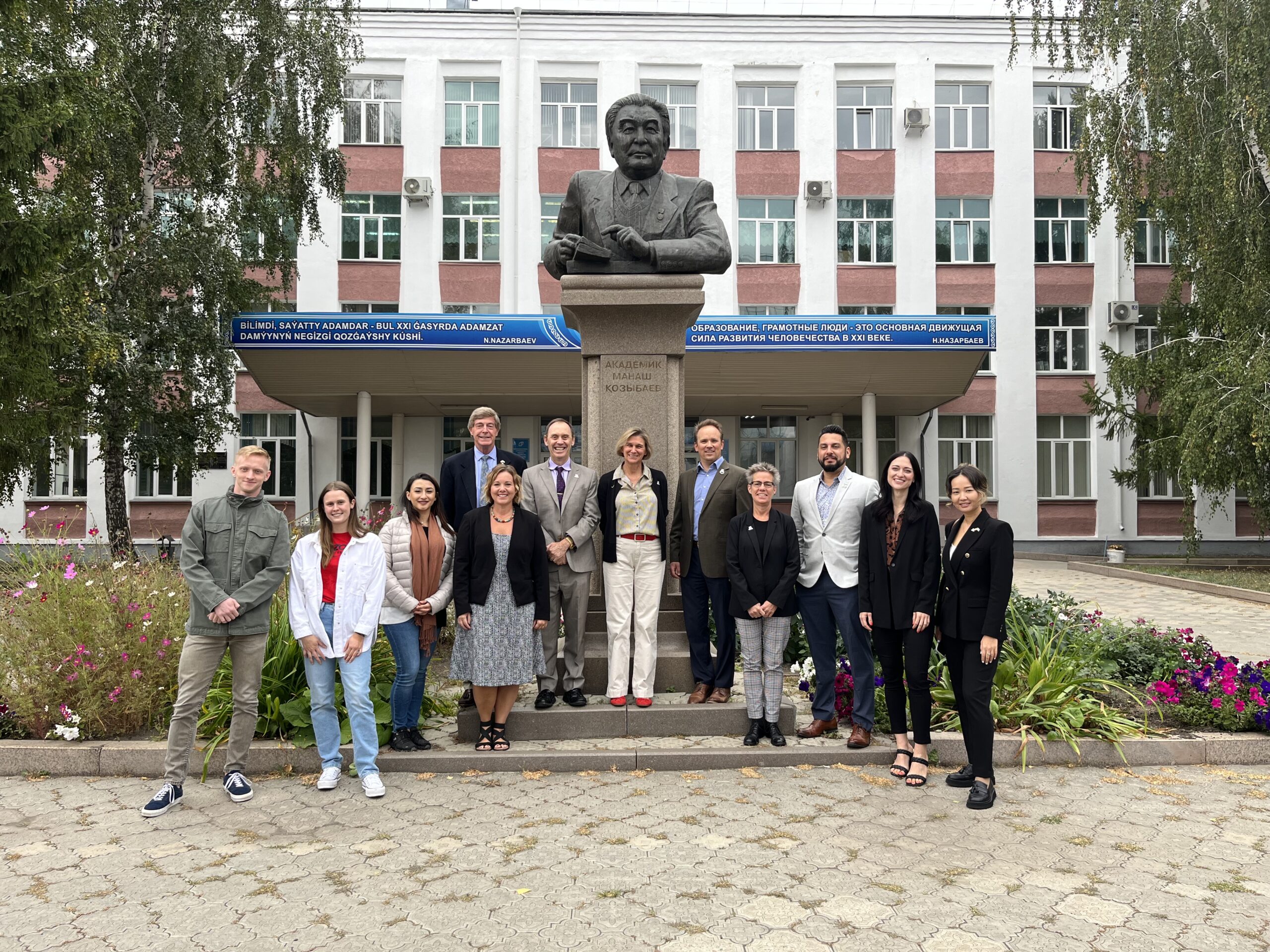ASTANA – This is the second part of The Astana Times exclusive interview with Hugh Hallman, Honorary Consul of Kazakhstan. In the first part, he elaborated on the transformative potential of diversifying Kazakhstan’s economic focus. He discussed how prioritizing education, agriculture, and human capital development can drive the nation’s progress beyond its reliance on oil and gas. Hallman also spoke about the similarities between Kazakh and American people.
In this part, Hallman delves into the transformative potential of Kazakhstan’s higher education system.

The original founders of the Kazakh American Free University during their 10th anniversary in Sept. 2004. From left to right: Hallman, holding the book “How to Do Business in Kazakhstan,” Mambetkaziyev, with his book “Universities in the 21st Century,” and Daniel Ballast. Photo credit: Hugh Hallman’s personal archive
In the first part of the interview, Hallman spoke about the potential of education, agriculture, and human capital for driving growth and how Kazakh people share similarities with Americans.
Nurturing Kazakhstan’s educational renaissance
In recent years, Kazakhstan has seen the establishment of over 10 new universities, with notable initiatives like University of Arizona offering a dual degree program at Kozybayev University in Petropavl, a venture spearheaded by Hallman.
Hallman, discussing his collaboration with Kazakh Minister of Science and Higher Education Sayasat Nurbek, emphasized the importance of investing in Kazakhstan’s future. He likened Kazakhstan’s developmental stage to that of the U.S. at its inception, noting historical parallels in societal challenges and the necessity of investing in education and infrastructure.

Hallman at Kozybayev University, where he played a key role in establishing a dual degree program with the Kozybayev project is University of Arizona. Photo credit: Hugh Hallman’s personal archive
“Think about the United States when it was 32 years old. The United States had slaves, women couldn’t vote, and there was no real investment in the people and the infrastructure. It was Abraham Lincoln, in 1862, who created the land grant university system to create the intellectual power needed to exploit America’s natural resources. Similarly, Kazakhstan has natural resources, but until you invest in the people, you can’t really create a result,” he said.
Reflecting on his two-year partnership with Minister Nurbek, Hallman commended his tireless dedication to the country’s advancement, citing remarkable progress achieved under his leadership.
“Kazakhstan, in part, because of the Soviet investment in education followed that example. Very few of the other former Soviet states have understood that, but Kazakhstan has continued to invest in its people, and now it is doing even more,” he said.
Hallman’s optimism stemmed from his encounters with visionary leaders in Kazakhstan’s education. He notably recalled meeting with Yerezhep Mambetkaziyev, the first Minister of Education of sovereign Kazakhstan. Mambetkaziyev’s extensive experience and innovative initiatives left a lasting impression on Hallman, highlighting Kazakhstan’s openness to progress and collaboration.
“I spent four days there with Mambetkaziyev, who said, ‘We need to have our students introduced to the West; we need an exchange student program, so that our students are exposed to Western economics, finance, philosophy, ethics, and law.’ The only way to do that was hard work, long hours, and education,” Hallman reminisced.
Triumph of trilingualism: cultivating multifaceted academic proficiency
Hallman also commented on the early adoption of trilingualism as a crucial value for Kazakhstan’s future.
“Speaking Kazakh historically is important; Russian is an important language in this region, while English is the language of the world. Having students here master three languages is crucially important to their future,” he said.
When asked about his advice to young people in Kazakhstan, he emphasized the importance of choosing the right path to success. He urged them to seek opportunities in places with growth potential rather than relying on established success stories.
“Going to places that are already successful is investing in the past. Instead, go to places that will be successful and allow you to ride that wave to the top. Fighting in the U.S. or in the Western countries to be ‘successful’ is a huge fight. Invest yourself in Kazakhstan, and you get to be Bill Gates of Kazakhstan. You get to be Elon Musk of Kazakhstan. Be one of those,” he concluded.
